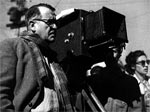CINEASTA

-
 Alberto Cavalcanti
Alberto Cavalcanti
(Brasil, 1897-1982)
Alberto Cavalcanti (6 de febrero de 1897, Río de Janeiro – 23 de agosto de 1982, París) fue un director y productor de cine brasileño. Nació en Río de Janeiro, hijo de un destacado matemático. Era un niño precozmente inteligente y a la edad de 15 años ya estaba estudiando derecho en la universidad. Tras una discusión con un profesor, fue expulsado y su padre lo envió a Ginebra, Suiza, con la condición de que no estudiara derecho o política. Cavalcanti optó por estudiar arquitectura y a los 18 años se trasladó a París, Francia, para trabajar por un arquitecto y más tarde como diseñador de interiores.
Marcel L'Herbier, una de las principales figuras del vanguardismo en Francia, le ofreció una oferta de trabajo como escenógrafo en 1923. En 1933, fue Londres para trabajar con el documentalista John Grierson, de la empresa General Post Office, y tras dirigir algunas películas, ocupó el cargo de productor en los años 1940.
En 1950 regresó a Brasil, donde participó del movimiento cinematográfico conocido como Cinema Novo. Además fundó dos productoras cinematográficas, Vera Cruz y Quino Films. A finales de los años 50 regresó a Europa y finalmante murió en París en 1982.
Alberto de Almeida Cavalcanti was born on February 6, 1897 and died on August 23, 1982. He was a Brazilian-born film director and producer. Cavalcanti was born in Rio de Janeiro, the son of a prominent mathematician. By the age of 15, he was studying law at university. Following an argument with a professor he was expelled. His father sent him to Geneva, Switzerland on condition that he did not study law or politics. Cavalcanti chose to study architecture instead. At 18 he moved to Paris to work for an architect, later switching to working on interior design. After a visit back to Brazil he took up a position at the Brazilian consulate in Liverpool, England.
Cavalcanti corresponded with Marcel L'Herbier, a leading light in France's avant-garde film movement. This led to a job offer from L'Herbier for Cavalcanti to work as a set designer.
In 1920, Cavalcanti left his job at the Consulate and moved back to France to work for L'Herbier; he was to be involved in the making of numerous films the most notable being L'Inhumaine. He was soon making his own films, in 1926 directing his first, Rien Que les Heures (Nothing But Time) — a day in the life of Paris and its citizens. In 1927 he collaborated with Walter Ruttmann on a similar project set in Berlin, called Berlin: Die Sinfonie der Großstadt (Berlin: Symphony of a Big City). Cavalcanti took a job with Paramount's French studios after the talkies came in, but he found himself making more commercial films which could not hold his interest and left Paramount in 1933.
In the same year, Cavalcanti returned to England to work for John Grierson's GPO Film Unit. He was involved in many capacities, from production to sound engineer. He was to spend seven years at the GPO Film Unit, working on many projects, most notably; Coal Face (1935), Night Mail (1936), Message to Geneva (1937), Four Barriers (1937), and Spare Time (1939). Much of Cavalcanti's work at the GPO was uncredited, he acted as a mentor to many new film makers, but in 1937 he was appointed acting head of the GPO Film Unit when Grierson left for Canada. When Cavalcanti was told that the only way the position could become permanent was to become a naturalized British citizen, he decided to leave the unit.
In 1940 Cavalcanti joined Ealing Studios, under the leadership of producer Michael Balcon. He worked as an art editor, producer and director. His most notable works were the propaganda films Yellow Caesar (1941), Went the Day Well? (1942), Three Songs of Resistance (1943), Champagne Charlie (1944), Dead of Night (as co-director) (1945) and Nicholas Nickleby (1947). In 1946 Cavalcanti left Ealing over a dispute about money. He went on to direct three more films in the UK, before returning to Brazil in 1950.
In Brazil Cavalcanti worked as a producer for Companhia Cinematográfica Vera Cruz; the company eventually became insolvent. After being blacklisted as a communist in Brazil, he moved back to Europe. He spent much of the 1960s and 1970s working as an itinerant film maker in various different countries, including East Germany, France and Israel.
Cavalcanti died in Paris at the age of 85.

Referencias en el Portal:
O Canto do Mar, 1953, Dirección
Copyright © 2026 Fundación del Nuevo Cine Latinoamericano. Todos los derechos reservados.
©Bootstrap, Copyright 2013 Twitter, Inc under the
Apache 2.0 license.

